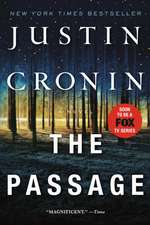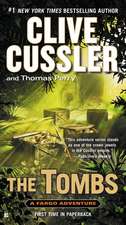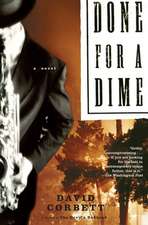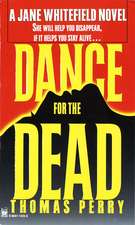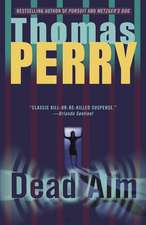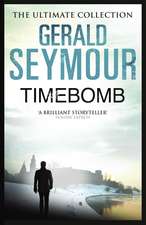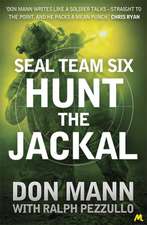Blood Money
Autor Thomas Perryen Limba Engleză Paperback – 31 mar 2002
Jane Whitefield, the fearless "guide" who helps people in trouble disappear, make victims vanish, has just begun her quiet new life as Mrs. Carey McKinnon, when she is called upon again, to face her toughest opponents yet.Jane must try to save a young girl fleeing a deadly mafioso.Yet the deceptively simple task of hiding a girl propels Jane into the center of horrific events, and pairs her with Bernie the Elephant, the mafia's man with the money.Bernie has a photographic memory, and in order to undo an evil that has been growing for half a century, he and Jane engineer the biggest theft of all time, stealing billions from hidden mafia accounts and donating the money to charity.Heart-stopping pace, fine writing, and mesmerizing characters combine inBlood Moneyto make it the best novel yet by the writer called "one of America's finest storytellers,"(San Francisco Examiner)."
Preț: 59.42 lei
Nou
Puncte Express: 89
Preț estimativ în valută:
11.37€ • 11.90$ • 9.41£
11.37€ • 11.90$ • 9.41£
Carte disponibilă
Livrare economică 15-29 martie
Preluare comenzi: 021 569.72.76
Specificații
ISBN-13: 9780804115414
ISBN-10: 0804115419
Pagini: 384
Dimensiuni: 108 x 175 x 26 mm
Greutate: 0.2 kg
Editura: BALLANTINE BOOKS
ISBN-10: 0804115419
Pagini: 384
Dimensiuni: 108 x 175 x 26 mm
Greutate: 0.2 kg
Editura: BALLANTINE BOOKS
Notă biografică
Thomas Perry won an Edgar for The Butcher’s Boy, and Metzger’s Dog was a New York Times Notable Book of the Year. His other books include The Face-Changers, Shadow Woman, Dance for the Dead, and Vanishing Act. He lives in Southern California with his wife and two daughters.
Extras
1
There were still moments when the old life seemed to be on the verge of returning—there would be something out of place near the vanishing point of her sight or in the periphery. A bit of the past seemed to materialize for an instant, just long enough to catch Jane’s eye and cause her to remember it, then recede again to become indistinguishable from the soft, familiar landscape. Sometimes it would be no more than a sound—a spring-loaded metallic click-scrape noise that turned out to be a door bolt slipping into its receptacle, but could have been the slide of a pistol cycling to snap the first round into the chamber.
Usually it would be a man who made her uneasy. A few times it had been men in crowds who had resembled other men from other times. Once it was only a stranger in a deserted mall parking structure who happened to be walking in the wrong place for too many steps—a bit behind Jane and to her right, where she would be most vulnerable to attack. The old habits of mind emerged again in a reflex. As she prepared her body to make the sudden dodge, her ears listened to his footsteps to detect a change in his position. Her eyes scanned the area around her to record its features—the shapes of parked cars she could put between them, small pools of bright light on the pavement to avoid, the railing she could roll over to drop to the next level down without running for the stairs. Then, as each of the others had done, this man changed his course, unaware that he had startled her, and walked off in another direction. Usually it had been men. Today, it was just a young girl. From a distance, the girl looked about fourteen: the thin, stringy blond hair that kept getting in her eyes; the narrow hips and bony chest; the clothes she wore that were a little too tight and too short, but made Jane wonder about her mother rather than about her. The girl first appeared on the Seneca reservation, and that was the first sign. She was too blond to be somebody’s cousin from Cattaraugus or Allegany, and too young to work for the government, and Jane couldn’t see any obvious explanation of how she had gotten there.
It was twelve miles from the Tonawanda reservation to the house in Amherst where Jane and Carey lived. Since Jane had begun to construct her new life she had spent more and more time on the reservation. First, she had visited friends and relatives, then let the friends talk her into going with them to meetings about tribal issues. At one of them she had volunteered to work in an after-school program to teach the old language to kids who had not learned it. All of them knew some words and phrases, and a few could make sentences, so the classes were easy and pleasant.
Jane had held her walks three times a week for over a year on the day when she first noticed the girl. Jane had waited on the high wooden front porch of Billy and Violet Peterson’s house under the tall hemlock and watched for the school buses. When enough of the children had gathered, Jane had gone inside with them and talked. The simple, inevitable logic of languages was appealing and satisfying to her students: “ah-ga-weh” is mine, “ho-weh” is his, “go-weh” is hers, “ung-gwa-weh” is ours, “swa-weh” is yours, “ho-nau-weh” is theirs.
But a language carried implications and assumptions that had to be explained. There was a history even in its lapses and absences. A modern Seneca conversation was filled with borrowed words for the things that filled the children’s houses—computers, television sets, microwave ovens.
Jane found herself taking the group out to walk the roads and fields and woods of the reservation to talk about the world. Whatever scurried across the path ahead of them or hung in the sky above or shaded them with its branches she could talk about without words from new languages.
Most of the time, if Jane saw a teenaged girl watching, she would wait until the girl’s curiosity led her close enough, then invite her to join the walk. This girl appeared at the edge of a distant stand of sycamores, then disappeared. Jane saw her five times that day, but the girl never came closer. Jane couldn’t help knowing at each moment the route the girl must be taking, and where she would appear next. That was part of what Jane had spent years training her mind to do. When she had seen the girl twice, she could follow the rest of her progress with as little conscious effort as a hunter needed to track the trajectory of a pheasant.
Jane asked her little band of linguists who the girl was, but each of them waited patiently for someone else to answer. Jane said, “If she comes to join us, I want everybody to make her feel welcome.”
But she didn’t. The last time was when Jane got into her car at the Petersons’ house. Jane considered driving a quarter mile, then quietly making her way back through the woods on foot to come up beside her for a talk. Jane lowered her head and pretended to search for something in her purse while she kept her eye on the rearview mirror. The girl was coming out of hiding to talk to a couple of Jane’s students. Now that she could see her clearly, Jane began to feel a vague sense of discomfort.
There was a haggard, feral look around the eyes, and a set to the thin lips. It was a small-featured, precocious look that reminded Jane of the undercover policewomen they sent into high schools to impersonate students. Jane started her car and slowly pulled out onto the highway. If the girl was just a girl—maybe a friend of one of the kids on the reservation—then probably she would overcome her shyness by Monday. If she wasn’t, then Jane had accomplished what she had needed to: she had memorized the face.
Almost certainly, this was just another time when Jane’s old reflexes had been triggered by something innocuous. She glanced at her watch. She would have just enough time to make a few calls for the hospital fund drive and then get ready for dinner.
Jane finished setting the dining room table, then walked back into the kitchen to wash the crystal wine glasses by hand. She had noticed that there were water spots on them. If Carey had been here, she would have said it was because the last time they had been put away, she and Carey had both been suffering from the ill effects of having used them the night before. They only had wine with dinner on special occasions, and special occasions always ended the same way in this house. The wine glasses would end up somewhere in the bedroom, and the dishes would be left for morning.
As Jane rinsed the two glasses and reached for the towel, she saw in her memory her mother making the same motion in the small house in Deganawida. Her mother had probably been the happiest woman Jane had ever met. She had also been a fraud. She had decided at the age of twenty—or twenty-two, as Jane had corrected her after her death—who she wanted most in the world to be, and then spent the rest of her life impersonating that woman. It had been a very sophisticated, wise thing to do, and what had prompted her to do it had been the same five or six years that had given her the sophistication. Jane had grown up knowing little about her mother that was true. Her mother had been an expert at cheerful evasion, and when Jane would ask insistent questions, she was capable of lying with tenacity and consistency. What was true was that Jane’s mother had somehow turned up in New York at the age of sixteen alone. The next five or six years were what she never spoke about. Jane had learned a little after she had grown up. Her mother had spent those years in the company of men who had money to share because they took it, and who, without thinking of it, offered her a certain safety because they inspired fear. At the end of the time, in a display of the preternatural cunning that people who live on the margins develop as a substitute for everything else, she had re-invented herself.
She had met Henry Whitefield, a worker in structural steel who traveled the country with a crew of men—three Mohawks and a couple of Onondagas from Grand River, and two other Senecas. Now that Jane was a grown woman, she knew that their chance meeting had been contrived. Her father, Henry Whitefield, had been too perfect a counter to the men her mother had decided to desert. He was tall, with skin like a copper penny and eyes like obsidian. He was scrupulously honest—even blunt—but most of all, he was manifestly not a man who could be dissuaded by any conceivable threat of harm. Men who walked on steel girders twenty-five floors above the street in uncertain winds were unlikely to be intimidated by anything they met on the ground. The fact that he traveled in the company of a whole crew of similar men would have reassured her too: she would have misinterpreted it at first, because it looked like the way her old companions behaved. But she had been a woman with acute instincts, and she had probably sensed that the misinterpretation was not entirely wrong: if he were in danger, the others would circle around him.
They were both long dead now, but they were not absent. They had taken up residence behind Jane’s eyelids. Jane’s mother had re-invented herself as Mrs. Henry Whitefield and lived the next eleven years in blissful imposture. She was the sort of wife who always looked as though she had just changed her clothes and fixed her makeup. She was the sort of mother who had time for everything and overdid the birthdays and indulgences. And she had tended Jane as though she were training her to rule a small kingdom.
Before Jane was born, her mother became conservative in dress and manner like other children’s mothers, but it didn’t disguise either the reasons why she had gotten into her troubles or why she had survived them. Henry Whitefield’s best friend, Jake Reinert, who still lived next door to the old house in Deganawida, had once said to Jane that her mother had been “the single best-looking female human being not only to live in Deganawida,” but, he had insisted, “the best-looking ever to pass through it by a nonflying conveyance.” Then he had added wistfully, “It’s a shame you didn’t get more of her . . . disposition.”
During the horrible summer, six years after her father was killed, when her mother was dying of cancer, there had been a frantic period of talk. Her mother would palm her medicine and fight the pain so she could talk to her for hours at a time. She had been doing something she admitted was laughable—trying to tell her daughter everything she would need to know from the age of nineteen to the age of forty.
Their conversations were full of things almost said: “After I met Henry I was never unhappy another day of my life.” For years afterward, Jane wondered at the foolishness of it, but she sensed that she had heard only part of it. Her mother had not told Jane that happiness was not something she had waited for, but something she had decided. Jane had carried the things her mother had said and done as though they were statements in another language, then slowly, one by one, she had realized that she understood them. In a way, she knew, she was emulating her mother. She had spent the early part of her adult life doing something that was dangerous—always illegal, and on the occasions when she made a wrong turn or a wrong guess, punctuated with bright flashes of violence. She had been a guide. People whose lives were in danger had found their way to her—first a young man she knew, and after that, a woman who simply knew someone she knew, and, later, strangers. She had moved them to other places, given them other names, and taught them how to live other lives. Then one day, she had agreed to become Mrs. McKinnon, and begun to make Jane Whitefield the last of the fugitives to disappear.
Since then she had devoted herself, just as her mother had, to being the woman she wanted to be. For the past two years, she had refused to allow herself to fall asleep at night without being able to say to herself, “This was a good day. I’m glad I didn’t waste it.” She was not ashamed of her premeditation. When Carey got home, she was going to demonstrate that her mother’s wisdom had not been lost on her. Carey didn’t have to go to the hospital tomorrow until evening rounds, and she had decided she was going to keep him up for most of the night. She went upstairs and began to fill the tub for her bath.
There were still moments when the old life seemed to be on the verge of returning—there would be something out of place near the vanishing point of her sight or in the periphery. A bit of the past seemed to materialize for an instant, just long enough to catch Jane’s eye and cause her to remember it, then recede again to become indistinguishable from the soft, familiar landscape. Sometimes it would be no more than a sound—a spring-loaded metallic click-scrape noise that turned out to be a door bolt slipping into its receptacle, but could have been the slide of a pistol cycling to snap the first round into the chamber.
Usually it would be a man who made her uneasy. A few times it had been men in crowds who had resembled other men from other times. Once it was only a stranger in a deserted mall parking structure who happened to be walking in the wrong place for too many steps—a bit behind Jane and to her right, where she would be most vulnerable to attack. The old habits of mind emerged again in a reflex. As she prepared her body to make the sudden dodge, her ears listened to his footsteps to detect a change in his position. Her eyes scanned the area around her to record its features—the shapes of parked cars she could put between them, small pools of bright light on the pavement to avoid, the railing she could roll over to drop to the next level down without running for the stairs. Then, as each of the others had done, this man changed his course, unaware that he had startled her, and walked off in another direction. Usually it had been men. Today, it was just a young girl. From a distance, the girl looked about fourteen: the thin, stringy blond hair that kept getting in her eyes; the narrow hips and bony chest; the clothes she wore that were a little too tight and too short, but made Jane wonder about her mother rather than about her. The girl first appeared on the Seneca reservation, and that was the first sign. She was too blond to be somebody’s cousin from Cattaraugus or Allegany, and too young to work for the government, and Jane couldn’t see any obvious explanation of how she had gotten there.
It was twelve miles from the Tonawanda reservation to the house in Amherst where Jane and Carey lived. Since Jane had begun to construct her new life she had spent more and more time on the reservation. First, she had visited friends and relatives, then let the friends talk her into going with them to meetings about tribal issues. At one of them she had volunteered to work in an after-school program to teach the old language to kids who had not learned it. All of them knew some words and phrases, and a few could make sentences, so the classes were easy and pleasant.
Jane had held her walks three times a week for over a year on the day when she first noticed the girl. Jane had waited on the high wooden front porch of Billy and Violet Peterson’s house under the tall hemlock and watched for the school buses. When enough of the children had gathered, Jane had gone inside with them and talked. The simple, inevitable logic of languages was appealing and satisfying to her students: “ah-ga-weh” is mine, “ho-weh” is his, “go-weh” is hers, “ung-gwa-weh” is ours, “swa-weh” is yours, “ho-nau-weh” is theirs.
But a language carried implications and assumptions that had to be explained. There was a history even in its lapses and absences. A modern Seneca conversation was filled with borrowed words for the things that filled the children’s houses—computers, television sets, microwave ovens.
Jane found herself taking the group out to walk the roads and fields and woods of the reservation to talk about the world. Whatever scurried across the path ahead of them or hung in the sky above or shaded them with its branches she could talk about without words from new languages.
Most of the time, if Jane saw a teenaged girl watching, she would wait until the girl’s curiosity led her close enough, then invite her to join the walk. This girl appeared at the edge of a distant stand of sycamores, then disappeared. Jane saw her five times that day, but the girl never came closer. Jane couldn’t help knowing at each moment the route the girl must be taking, and where she would appear next. That was part of what Jane had spent years training her mind to do. When she had seen the girl twice, she could follow the rest of her progress with as little conscious effort as a hunter needed to track the trajectory of a pheasant.
Jane asked her little band of linguists who the girl was, but each of them waited patiently for someone else to answer. Jane said, “If she comes to join us, I want everybody to make her feel welcome.”
But she didn’t. The last time was when Jane got into her car at the Petersons’ house. Jane considered driving a quarter mile, then quietly making her way back through the woods on foot to come up beside her for a talk. Jane lowered her head and pretended to search for something in her purse while she kept her eye on the rearview mirror. The girl was coming out of hiding to talk to a couple of Jane’s students. Now that she could see her clearly, Jane began to feel a vague sense of discomfort.
There was a haggard, feral look around the eyes, and a set to the thin lips. It was a small-featured, precocious look that reminded Jane of the undercover policewomen they sent into high schools to impersonate students. Jane started her car and slowly pulled out onto the highway. If the girl was just a girl—maybe a friend of one of the kids on the reservation—then probably she would overcome her shyness by Monday. If she wasn’t, then Jane had accomplished what she had needed to: she had memorized the face.
Almost certainly, this was just another time when Jane’s old reflexes had been triggered by something innocuous. She glanced at her watch. She would have just enough time to make a few calls for the hospital fund drive and then get ready for dinner.
Jane finished setting the dining room table, then walked back into the kitchen to wash the crystal wine glasses by hand. She had noticed that there were water spots on them. If Carey had been here, she would have said it was because the last time they had been put away, she and Carey had both been suffering from the ill effects of having used them the night before. They only had wine with dinner on special occasions, and special occasions always ended the same way in this house. The wine glasses would end up somewhere in the bedroom, and the dishes would be left for morning.
As Jane rinsed the two glasses and reached for the towel, she saw in her memory her mother making the same motion in the small house in Deganawida. Her mother had probably been the happiest woman Jane had ever met. She had also been a fraud. She had decided at the age of twenty—or twenty-two, as Jane had corrected her after her death—who she wanted most in the world to be, and then spent the rest of her life impersonating that woman. It had been a very sophisticated, wise thing to do, and what had prompted her to do it had been the same five or six years that had given her the sophistication. Jane had grown up knowing little about her mother that was true. Her mother had been an expert at cheerful evasion, and when Jane would ask insistent questions, she was capable of lying with tenacity and consistency. What was true was that Jane’s mother had somehow turned up in New York at the age of sixteen alone. The next five or six years were what she never spoke about. Jane had learned a little after she had grown up. Her mother had spent those years in the company of men who had money to share because they took it, and who, without thinking of it, offered her a certain safety because they inspired fear. At the end of the time, in a display of the preternatural cunning that people who live on the margins develop as a substitute for everything else, she had re-invented herself.
She had met Henry Whitefield, a worker in structural steel who traveled the country with a crew of men—three Mohawks and a couple of Onondagas from Grand River, and two other Senecas. Now that Jane was a grown woman, she knew that their chance meeting had been contrived. Her father, Henry Whitefield, had been too perfect a counter to the men her mother had decided to desert. He was tall, with skin like a copper penny and eyes like obsidian. He was scrupulously honest—even blunt—but most of all, he was manifestly not a man who could be dissuaded by any conceivable threat of harm. Men who walked on steel girders twenty-five floors above the street in uncertain winds were unlikely to be intimidated by anything they met on the ground. The fact that he traveled in the company of a whole crew of similar men would have reassured her too: she would have misinterpreted it at first, because it looked like the way her old companions behaved. But she had been a woman with acute instincts, and she had probably sensed that the misinterpretation was not entirely wrong: if he were in danger, the others would circle around him.
They were both long dead now, but they were not absent. They had taken up residence behind Jane’s eyelids. Jane’s mother had re-invented herself as Mrs. Henry Whitefield and lived the next eleven years in blissful imposture. She was the sort of wife who always looked as though she had just changed her clothes and fixed her makeup. She was the sort of mother who had time for everything and overdid the birthdays and indulgences. And she had tended Jane as though she were training her to rule a small kingdom.
Before Jane was born, her mother became conservative in dress and manner like other children’s mothers, but it didn’t disguise either the reasons why she had gotten into her troubles or why she had survived them. Henry Whitefield’s best friend, Jake Reinert, who still lived next door to the old house in Deganawida, had once said to Jane that her mother had been “the single best-looking female human being not only to live in Deganawida,” but, he had insisted, “the best-looking ever to pass through it by a nonflying conveyance.” Then he had added wistfully, “It’s a shame you didn’t get more of her . . . disposition.”
During the horrible summer, six years after her father was killed, when her mother was dying of cancer, there had been a frantic period of talk. Her mother would palm her medicine and fight the pain so she could talk to her for hours at a time. She had been doing something she admitted was laughable—trying to tell her daughter everything she would need to know from the age of nineteen to the age of forty.
Their conversations were full of things almost said: “After I met Henry I was never unhappy another day of my life.” For years afterward, Jane wondered at the foolishness of it, but she sensed that she had heard only part of it. Her mother had not told Jane that happiness was not something she had waited for, but something she had decided. Jane had carried the things her mother had said and done as though they were statements in another language, then slowly, one by one, she had realized that she understood them. In a way, she knew, she was emulating her mother. She had spent the early part of her adult life doing something that was dangerous—always illegal, and on the occasions when she made a wrong turn or a wrong guess, punctuated with bright flashes of violence. She had been a guide. People whose lives were in danger had found their way to her—first a young man she knew, and after that, a woman who simply knew someone she knew, and, later, strangers. She had moved them to other places, given them other names, and taught them how to live other lives. Then one day, she had agreed to become Mrs. McKinnon, and begun to make Jane Whitefield the last of the fugitives to disappear.
Since then she had devoted herself, just as her mother had, to being the woman she wanted to be. For the past two years, she had refused to allow herself to fall asleep at night without being able to say to herself, “This was a good day. I’m glad I didn’t waste it.” She was not ashamed of her premeditation. When Carey got home, she was going to demonstrate that her mother’s wisdom had not been lost on her. Carey didn’t have to go to the hospital tomorrow until evening rounds, and she had decided she was going to keep him up for most of the night. She went upstairs and began to fill the tub for her bath.
Recenzii
“Brilliant . . . Buy it: I guarantee you’ll be up all night.”
–Los Angeles Times
“DOWNRIGHT DAZZLING. . . The little voice that promises adventure and danger in Thomas Perry’s hide-and-seek thrillers sends out another irresistible summons in Blood Money.”
–The New York Times Book Review
“It didn’t take long before I was hooked, totally immersed in the life of Jane Whitefield. . . . The plot takes one unexpected turn after another.”
–Austin American Statesman
–Los Angeles Times
“DOWNRIGHT DAZZLING. . . The little voice that promises adventure and danger in Thomas Perry’s hide-and-seek thrillers sends out another irresistible summons in Blood Money.”
–The New York Times Book Review
“It didn’t take long before I was hooked, totally immersed in the life of Jane Whitefield. . . . The plot takes one unexpected turn after another.”
–Austin American Statesman
Descriere
"Disappearance expert" Jane Whitefield helps teenager Rita Shelford, who kept house for an old man in Florida for a year not knowing he was the Mafia's moneyman. Now that the man's been murdered, the Mob suspects Rita of stealing the only record of a shady investment worth billions. Unless Jane, the last hope for the hunted, can spirit Rita into a new identity, she's as good as dead. (May)





